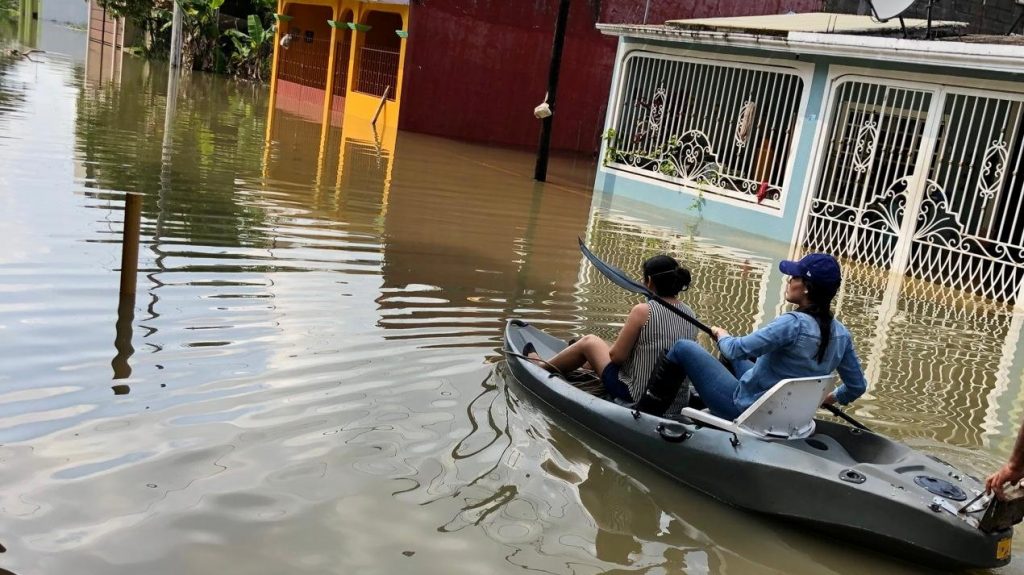Church leaders in Central America prayed for protection as a second hurricane in less than two weeks stormed toward the already battered region. Officials of the church's aid agency, Caritas, and parishes again mobilized to provide shelter to populations still trying to clean up and rebuild after Hurricane Eta deluged Nicaragua, Honduras and Guatemala.
"We ask God with faith that (Hurricane Iota) doesn't attack us with as much strength," as the previous Hurricane Eta did, Cardinal Óscar Rodríguez Maradiaga of Tegucigalpa prayed Nov. 15, according to Honduras media outlet Radio América.
"It's sad that we live in fear, not simply due to the tragedy we experienced with Eta, but due to the threat of another hurricane."
Hurricane Iota gathered strength over the Caribbean -- reaching Category 5 status -- and was expected to hit the Mosquito Coast region near the Nicaragua-Honduras border sometime late Nov. 16.
The U.S. National Weather Service described a "catastrophic situation unfolding for Nicaragua" with an "extreme storm surge of 15-20 feet, destructive winds and up to 30 inches of rainfall." Even worse, Hurricane Iota was expected to make landfall in almost the "exact same location" as Hurricane Eta less than two weeks earlier.
Father Francisco Chavarría, Caritas director in Nicaragua, told Catholic News Service Iota would bring "more intense rain" and have a wider radius. Parishes and chapels were again being converted into shelters and priests were helping evacuate people, many of whose homes had their roofs blown off and had lost their modest crops, he said.
Hurricane Eta lost steam as it moved across Central America, becoming a tropical depression. But it still deluged an already saturated region, triggering mudslides, flooding and rising rivers, which washed away bridges. An estimated 200 people died throughout Central America and southern Mexico.
Parishes in Honduras were preparing to assist people displaced by flooding, said Father Germán Calix, Caritas Honduras director. Some people resisted evacuation orders with Hurricane Eta, but he said those admonishments were not being ignored with a second hurricane expected.
Father Calix attributed the enormous hurricane damage in Honduras to an "ecological disaster," in which deforestation has been rife, and said climate change has had consequences. He also spoke of a poor government response as politicians focus more on elections in 2021 than Honduras' present problems.
"They're not really interested in the country. They're only interested in themselves," Father Calix said. "This makes people desperate" and likely to migrate, he said. "Life has become very, very, very hard."
Hurricane Mitch heaped misery on Honduras in 1998 as it sat over the country and dropped record rainfall. It claimed an estimated 9,000 lives. Some in Honduras say the most recent storm -- while not as destructive -- felt similar to Hurricane Mitch in some areas.
"This was harder than Hurricane Mitch (locally) in the sense that the water density was far bigger," Franciscan Father Alberto Gauci wrote in an email from the Olancho region after Hurricane Eta passed through. "What happened here was that two big rivers ... became one big ocean of water that changed all the map of Olancho."
Heavy rains in Guatemala also caused flooding, along with mudslides. A mudslide buried homes in the indigenous village of San Cristóbal Verapaz and left an estimated 100 people missing, according to Guatemalan authorities.
"The flooding was of such a magnitude that many people had to spend up to five days on the roofs of their homes ... waiting for rescuers to arrive," Bishop Domingo Buezo Leiva of Izabal in eastern Guatemala told CNS.
"Everything was lost. The hopes people had of harvesting something in three months is something they no longer have."
The bishop said parishes and Caritas responded to Hurricane Eta by organizing collections of food and household items. But a second storm would be devastating and would further motivate people -- already desperate due to the pandemic -- to try migrating to the United States.
"The migration, in both Honduras and Guatemala, is surely going to grow," he said, "but I don't know how because the (enforcement) measures are increasingly rough."

